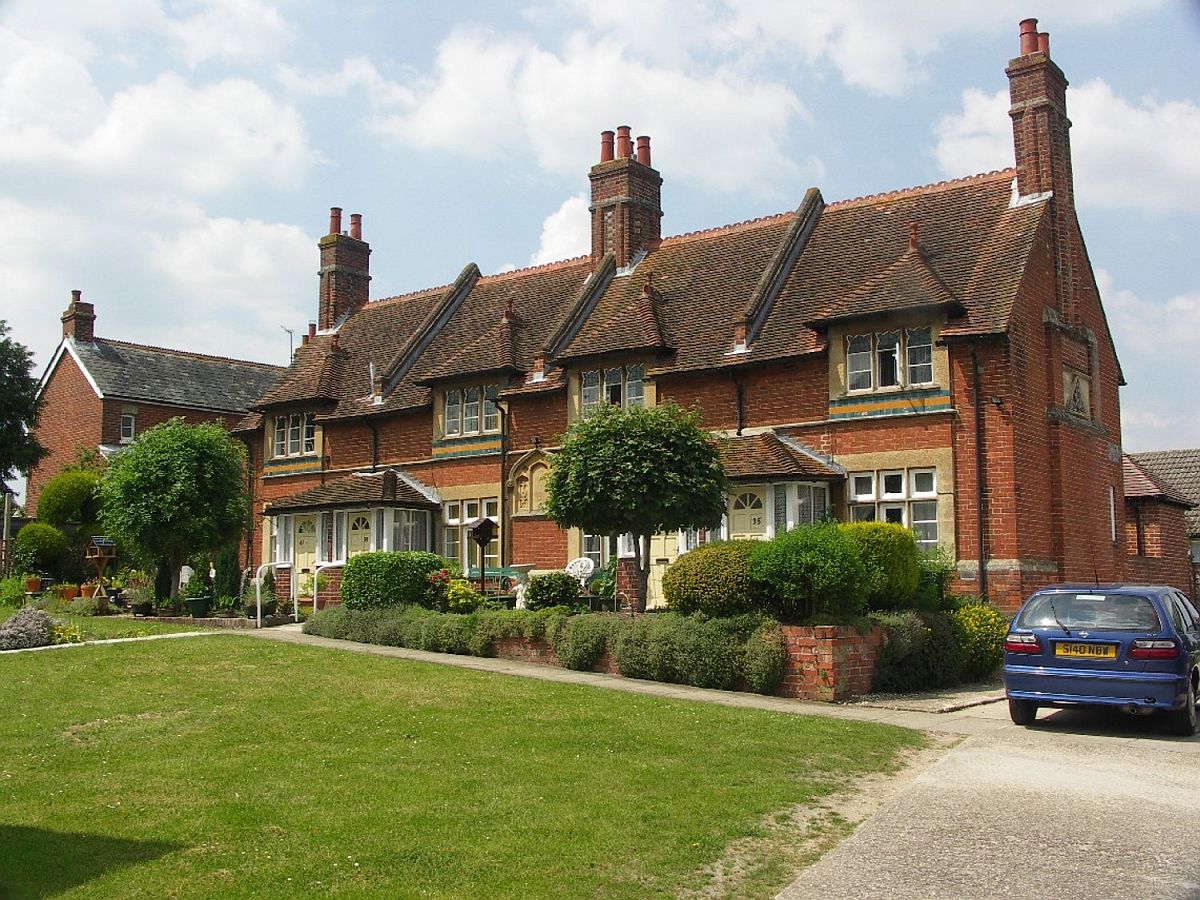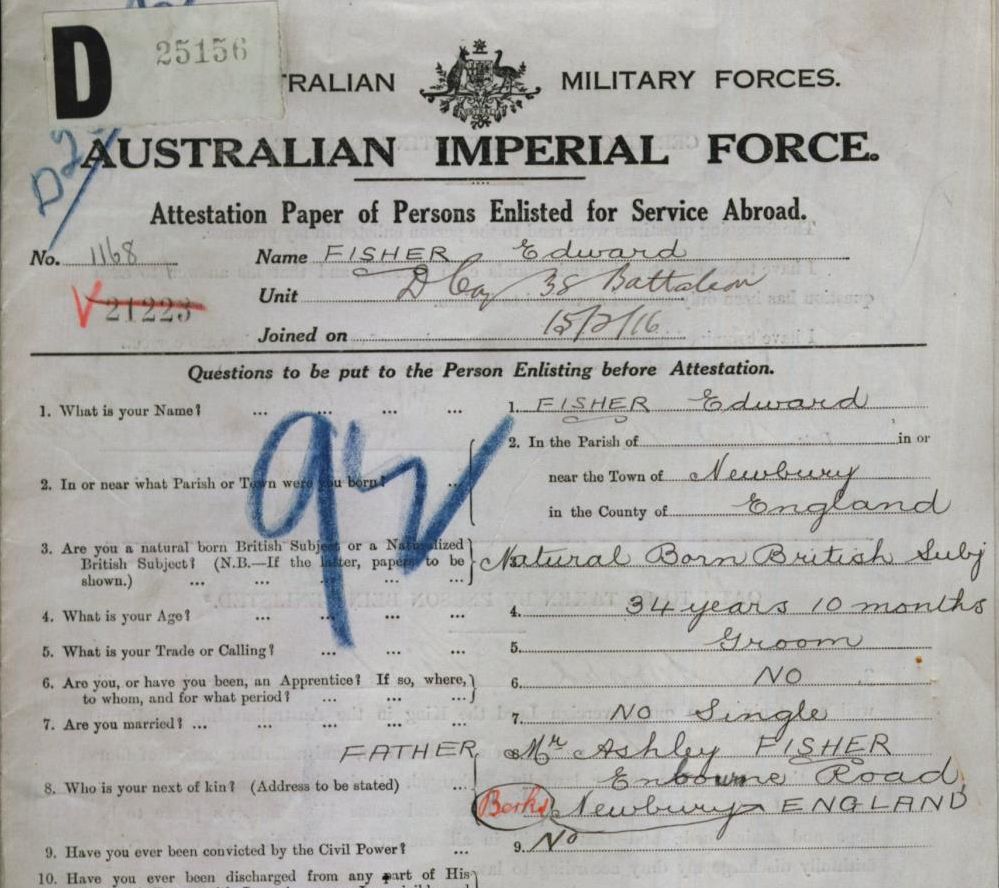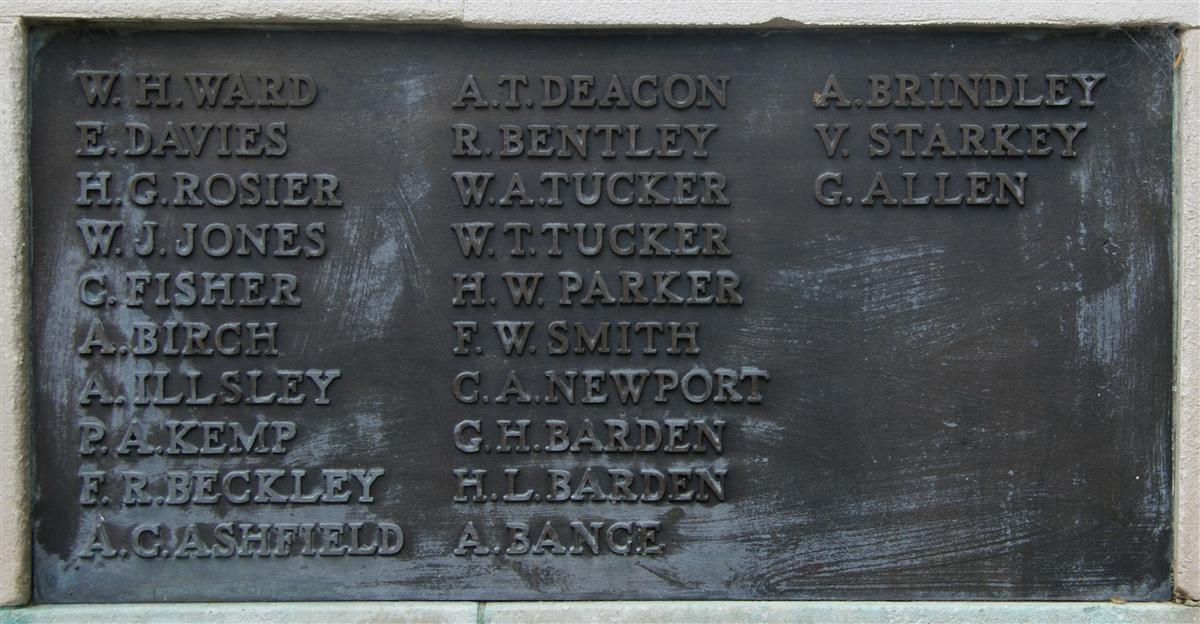Edward Rowles Fisher
Private 1168 Edward Fisher, 38th Battalion, Australian Imperial Force
Edward was born in Newbury in 1879 the youngest son of Ashley Fisher and his wife Elizabeth née Rowles. He had a younger sister, Emily Jessy (born 1882), and large number of elder siblings. The 1911 census form included a column in which couples were expected to state the number of children they had had, how many had died and how many had survived – the Government was taking tentative steps to quantify the huge problem of infant mortality. Ashley’s return noted that they had a total of fifteen children, six had died, nine survived. To date only thirteen of the children have been identified from birth registrations and census returns: Sarah (1855), Alice (1857), Henry (1858), Arthur (1861), Francis (1862), Charles Ashley (1864), Elizabeth (1867), George (1869), Edith (1872), Kate (1874), Albert Ashley (1877), Edward (1879) and Emily Jessy (1882). Sarah (died 1887) and Francis (1897) died before the 1911 census but as adults – one wonders how the statistics derived from the census dealt with such cases? However, Arthur (1862) and Emily (1883) were exactly the sort of infant deaths the census was aiming to measure, as, presumably, were the two other as yet unidentified children.
Ashley was a bricklayer by trade and raised his large family in a small house at 5 Quakers’ Burial Ground – the splendidly morbid address that was applied to a terrace of five small cottages alongside the old Quaker burial ground. The cottages were owned by the Quakers (Society of Friends) and were alongside the disused burial ground. They were sold during the war and the site was used to extend the town’s livestock market. As the children left home Ashley and Elixabeth moved, first ca1895 to a cottage in Mayor’s Lane, very close to the Quaker’s Burying Ground, and then, in 1906, to 3 Coxedd & Pearce’s Alsmhouses.

Coxedd & Pearce's Almshouses - Edward's parents lived at No 2.. |
Newbury has a great many almshouse charities that have been founded over the centuries to provide decent accommodation to the deserving poor in the twilight of their years. Francis Coxedd and Thomas Pearce each left in their wills (1690 and 1672 resp.) funds to provide two cottages for use as almshouses. For almost two centuries these were small timber framed cottages in West Mills until, in 1884, the Trustees, having decided that they were no longer fit homes, combined to build replacement homes in Enborne Road. In 1906 these were still relatively new and more generously proportioned than the older almshouses closer to the town centre.
Edward was the only child (aged 21) still living with his parents at the time of the 1901 census, but it is unlikely that he would have moved into the almshouse with them, indeed, his presence as potential breadwinner could well have disqualified them from the award of the almshouse. It is not known where he was living at this time.
On 2 March 1911 Edward boarded the SS Geelong bound for Australia – at the age of 31 he was emigrating. He settled in the Melbourne area and found work as a groom.
When Britain declared war on Germany in 1914 it was the British Empire than went to war, however, different colonies responded to the call to arms in their own way. Australians, both native and British born responded by volunteering for service, much as the lads in the UK. Many stepped up immediately, others delayed the momentous decision that would change, perhaps end, their lives. In the UK the stream of volunteers failed to meet the demands of the war of attrition being fought in France and Belgium resulting in the introduction of conscription in early 1916 – this did not apply outside the UK, Australia never introduced mandatory service. Nevertheless, Australians continued to volunteer, including Edward, who attested (the process of being sworn in) for service on 15 February 1916. Four months later, on 20 June, he boarded HMAT Runic bound for Plymouth with the 38th Battalion, Australian Imperial Force. The Runic duly reached in Plymouth where the battalion disembarked on 11 August.

Edward's attestation form.. |
Much of the Australian infantry’s training took place in the UK and the 38th Battalion went to Larkhill in Wiltshire to prepare for life at the front. While there Edward was up before the CO charged with a ‘shortage of clothing’. It is not known which clothing was missing but he was charged 8d for its replacement. Perhaps this rankled for it was only a few days later that he went absent without leave. This was not uncommon and was treated relatively leniently as long as the absence was not too long and occurred in the UK – at the front it could be a capital offence. Edward was absent from midnight on 13 November until 9pm on 16 November – he may well have been taking a little self-awarded leave, perhaps he took the opportunity to return to Newbury and visit his parents and siblings? He was docked three days pay (15/-) and confined to barracks for seven days.
Before his sentence was completed, he and the battalion were on a boat to France where they landed on 22 November 1916. In late January 1917 he spent a few days in hospital with gastro-enteritis. Then on 12 February he was sent for duty with the 3rd Australian Tunnelling Company.
There is no record of his return to the 38th Battalion, but it was the CO of that unit who reported his death in action on 31 May 1917. Neither of the war diaries of the 38th Battalion or the 3rd Tunnelling Company report any casualties on the 31 May! The Tunnelling Company was working in a quiet section of the front and suffered few losses in this period, but the 38th Battalion carried out some trench raids on 28th May in which they incurred severe casualties – 30 killed or missing, 65 wounded. However, the diary is very sparse and has no entry between 28 May and 2 June, it really only reports battalion activities, not the minor daily occurrences in the trenches. The location of his burial near the 38th Battalion's positions at Ploegsteert suggests that Edward had returned to his unit and was killed in those positions – occasional casualties from sniping, shell fire etc were inevitable in front line units – suspiciously few of these are reported in the war diary, presumably they were not deemed of sufficient note.
He was buried in grave III.B.2 at Strand Military Cemetery just north of the village of Ploegsteert, south of the Ploegsteert Memorial.
The news travelled home to Newbury:
Newbury Weekly News, 19 July 1917 – Killed in Action
FISHER. – Killed in action in May, 1917, somewhere in France, Pte Ed Fisher, of the Australian Imperial Forces, aged 36, younger son of Mr A Fisher, of Enborne-road. – “Greater love hath no man that this that he lay down his life for his friends.” – With deep sympathy from his sincere friends.
The anniversary of his death was marked in the same paper:
Newbury Weekly News, 6 June 1918 – In Memoriam
In ever loving memory of Pte Edward Fisher, Australian Imperial Forces, killed in action somewhere in France, June 2nd, 1917. Greater love hath no man that this that he lay down his life for his friends.
Although he is now lost to sight,
To memory he’s still dear;
They sent him o’er the sea to fight,
He went without a fear.
He fought for his King and Country,
He died a hero’s death;
Now with our Heavenly Father
God grant him perfect rest.
From his ever sincere friend, Mrs Oliver, 5, Junction Terrace, Hambridge-road, Newbury.
 Edward's name on Newbury War Memorial as C Fisher. (centre left) |
Locally he is remembered on tablet 6 of the Newbury Town Memorial (as C Fisher) and on the memorial board and roll of honour in St Nicolas’ Church.
The incorrect initial on the Town Memorial cannot be explained, as several can, by a transcription error when the weathered stone tablets were read prior to their replacement with the existing bronze tablets in 1950. C Fisher also appears in the Order of Service used during the dedication and unveiling of the memorial in 1922. However, the two parish memorials in St Nicolas’ Church have the correct initial, the most probably explanation is bad handwriting – the compiler of the names for the memorial simply misread the name submitted.

Find a memorial :
| Died this day: | |
| 02 March 1919 | |
| Ernest H H Youngs | |
| Theale |

Like this site? Show your appreciation through a donation to a great charity.